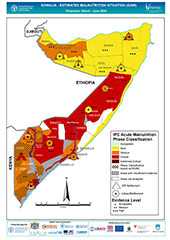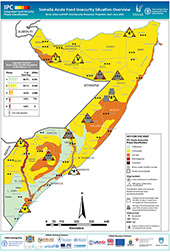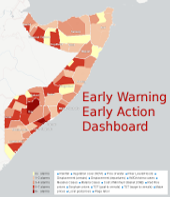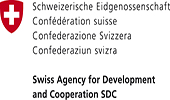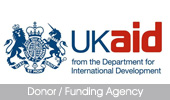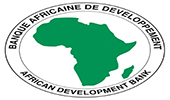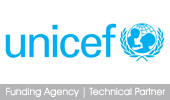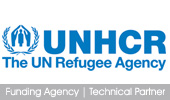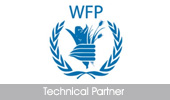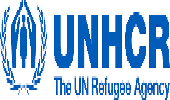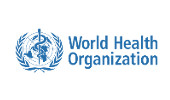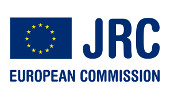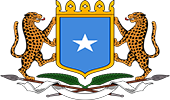Drought Alerts
 The short rains or Deyr season have failed in most parts of the country and with continuing insecurity and severely restricted humanitarian space, the number of people in crisis is expected to rise from the current estimates of 2 million. Somalia is a rainfall dependent country, therefore when good rains are reported as in the last season, food production thus food security improves dramatically. However when the rainfall fails, the effects on livelihoods, household food security and nutrition levels, can be devastating. Already water supplies have started to dwindle, crop production is expected to be severely below normal and livestock deaths are being reported in some areas. Of most concern are the areas that have been in crisis for the past three years such as Sanaag, Galgadud and Mudug, Hiran and Bakool regions where populations do not have the resilience to cope with this new shock. New areas in crisis are emerging in Sool, Gedo, and Juba regions.
The short rains or Deyr season have failed in most parts of the country and with continuing insecurity and severely restricted humanitarian space, the number of people in crisis is expected to rise from the current estimates of 2 million. Somalia is a rainfall dependent country, therefore when good rains are reported as in the last season, food production thus food security improves dramatically. However when the rainfall fails, the effects on livelihoods, household food security and nutrition levels, can be devastating. Already water supplies have started to dwindle, crop production is expected to be severely below normal and livestock deaths are being reported in some areas. Of most concern are the areas that have been in crisis for the past three years such as Sanaag, Galgadud and Mudug, Hiran and Bakool regions where populations do not have the resilience to cope with this new shock. New areas in crisis are emerging in Sool, Gedo, and Juba regions.
The Food Security and Nutrition Analysis Unit –Somalia (FSNAU) is closely following the early impact of the drought on Somalia’s food security and nutrition situations and will periodically publish regional insights. These Drought Alerts will be bringing you snapshots of situation across Somalia on the most recent available data until the integrated analysis of the comprehensive countrywide assessment will be released on January 28th 2011.
- Drought in Horn of Africa threatens millions
14 June 2011, Rome/Nairobi - The number of people facing severe food shortages is set to increase as the impact of drought, along with high food and fuel prices, continues to grip the Horn of Africa region, FAO warned today. High levels of acute malnutrition are widespread and more than 8 million people in Djibouti, Ethiopia, Kenya and Somalia are in need of emergency assistance. The region has now experienced two consecutive seasons of significantly below-average rainfall, resulting in failed crop production, depletion of grazing resources and significant livestock mortality.
Read More - Press Release: Drought impact intensifies as rains delay
April 27, NAIROBI –The number of needy Somalis is set to increase as the impact of drought continues to grip the Horn of Africa country, the UN has warned. Currently, 2.4 million Somalis—32 percent of the country’s population, are in need of humanitarian assistance but with the ongoing conflict coupled with the current drought blighting crops and killing livestock, many more Somalis may fall into crisis.
Read More - Press Release: Somalia faces severe water crisis as drought looms
NAIROBI, January 28 – Somalia is facing a severe water shortage following failure of the short rains also known as Deyr, heightening fears of deepening humanitarian crisis in coming months, a new report shows. Read More - Increased Malnutrition in Gedo Region
January 10th 2011 - Latest findings from three surveys in Somalia’s southern region of Gedo show significantly high levels of malnutrition in the month of December 2010. Read More - UN calls for humanitarian access as drought hits Somalia
NAIROBI, 7 January 2011 - The United Nations Resident and Humanitarian Coordinator for Somalia, Mr. Mark Bowden, has expressed concern about the unfolding drought situation in Somalia and has called for humanitarian access to the most affected areas. Read Press Release: English Version (PDF, 19KB) | Somali Version (PDF, 20KB) - Nutrition crisis in Somalia's Juba regions
Findings from three nutrition survey indicate an alamingly high level of malnutrition is southern Somalia regions of Juba as largely a result of drought in the Horn of Africa nation. Read More - Focus on Post Deyr 10/11 Season Early Warning
December 16 2010 - There are clear signs of a worsening food security situation in most livelihoods of Somalia, as a result of unusually below average precipitation caused by the La Niña meteorological phenomenon. The impact of the poor performance of Deyr rains is demonstrated by failed crops in most of the southern crop-producing regions, and considerable water and pasture shortages in most key pastoral areas of the country, causing deterioration in livestock conditions. These developments indicate reduced food production (cereals, milk and meat) in the country, which will consequently be reflected in increased food prices and the numbers of food insecure people is likely to rise in early 2011. Download the Brief (PDF, 4.49MB)
Related Downloads
- SWALIM - Somalia Dekadal Rainfall Update, June 2011 (PDF, 338KB)
- UNOCHA - Eastern Africa Drought Humanitarian Report, June 2011 (PDF, 1.10MB)
- FEWSNET - East Africa Regional Rain Watch, June 2011 (PDF, 1.07MB)
- FEWSNET - Somalia Rain Watch, May 2011 (PDF, 512KB)
- FEWSNET's Drought Alert for Eastern Horn of Africa: Past year one of the driest on record in the Eastern Horn (PDF, 588KB)
- Localized heavy rainfall over Somalia has improved drought conditions across southern and central portions of the country.
FEWSNET's Weather Hazards Impacts Assessment for Africa, May 12 – May 18, 2011 (PDF, 327KB)
In the Media
- FSNAU Chief Technical Officer, Grainne Moloney talks to BBC World Service about the worsening drought situation in Somalia, 22nd April 2011
- Somali News: Somalia faces severe water crisis as drought looms
- Somalia’s Resilience to Drought Improves, Security Still Impedes Aid
- Reuters Africa - Somalia faces worst drought in five years - UN
- IRIN News Podcast: Grainne Moloney of Food Security & Nutrition Analysis Unit (FSNAU) on drought and its impact in Somalia
- Mark Bowden on BBC Network Africa - 7th January, 2011
Go to Network Africa, 03:30GMT; Mark Bowden's interview is after the Sports news, towards the end of the bulletin.
Mark Bowden is the UN Resident Coordinator Humanitarian Coordinator for Somalia. - VOA News on Somalia Drought
